2016年秋八年级英语上册 Module 1 How to learn English语法聚焦 (新版)外研版
- 格式:doc
- 大小:238.50 KB
- 文档页数:2
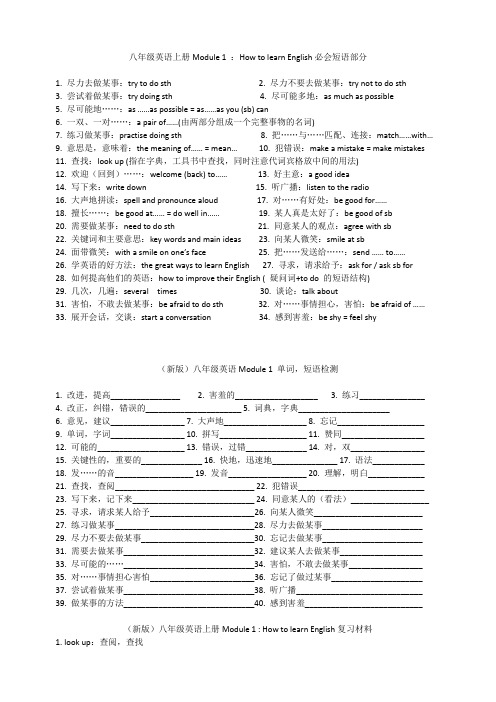
八年级英语上册Module 1 :How to learn English必会短语部分1. 尽力去做某事:try to do sth2. 尽力不要去做某事:try not to do sth3. 尝试着做某事:try doing sth4. 尽可能多地:as much as possible5. 尽可能地……:as ……as possible = as……as you (sb) can6. 一双、一对……:a pair of……(由两部分组成一个完整事物的名词)7. 练习做某事:practise doing sth 8. 把……与……匹配、连接:match……with…9. 意思是,意味着:the meaning of…… = mean…10. 犯错误:make a mistake = make mistakes11. 查找:look up (指在字典,工具书中查找,同时注意代词宾格放中间的用法)12. 欢迎(回到)……:welcome (back) to……13. 好主意:a good idea14. 写下来:write down 15. 听广播:listen to the radio16. 大声地拼读:spell and pronounce aloud 17. 对……有好处:be good for……18. 擅长……:be good at…… = do well in……19. 某人真是太好了:be good of sb20. 需要做某事:need to do sth 21. 同意某人的观点:agree with sb22. 关键词和主要意思:key words and main ideas 23. 向某人微笑:smile at sb24. 面带微笑:with a smile on one’s face 25. 把……发送给……:send …… to……26. 学英语的好方法:the great ways to learn English 27. 寻求,请求给予:ask for / ask sb for28. 如何提高他们的英语:how to improve their English ( 疑问词+to do 的短语结构)29. 几次,几遍:several times 30. 谈论:talk about31. 害怕,不敢去做某事:be afraid to do sth 32. 对……事情担心,害怕:be afraid of ……33. 展开会话,交谈:start a conversation 34. 感到害羞:be shy = feel shy(新版)八年级英语Module 1 单词,短语检测1. 改进,提高________________2. 害羞的___________________3. 练习_______________4. 改正,纠错,错误的______________________5. 词典,字典_____________________6. 意见,建议_________________7. 大声地___________________8. 忘记____________________9. 单词,字词_________________ 10. 拼写____________________ 11. 赞同___________________ 12. 可能的____________________ 13. 错误,过错______________ 14. 对,双_________________ 15. 关键性的,重要的______________ 16. 快地,迅速地_______________ 17. 语法____________ 18. 发……的音__________________ 19. 发音__________________ 20. 理解,明白_____________ 21. 查找,查阅________________________________ 22. 犯错误_____________________________ 23. 写下来,记下来____________________________ 24. 同意某人的(看法)__________________ 25. 寻求,请求某人给予________________________26. 向某人微笑_________________________ 27. 练习做某事________________________________28. 尽力去做某事_______________________ 29. 尽力不要去做某事__________________________30. 忘记去做某事_______________________ 31. 需要去做某事______________________________32. 建议某人去做某事___________________ 33. 尽可能的……______________________________34. 害怕,不敢去做某事_________________ 35. 对……事情担心害怕________________________36. 忘记了做过某事_____________________ 37. 尝试着做某事______________________________38. 听广播_____________________________ 39. 做某事的方法______________________________40. 感到害羞___________________________(新版)八年级英语上册Module 1 : How to learn English复习材料1. look up:查阅,查找(考点):【动词+副词】组成的短语如:look up / write down / pick up使用规律:代词宾格放中间,具体名词放两边2. Welcome back:欢迎回来(考点):①作动词:welcome sb (back) to……:欢迎某人(回)到……地方②作名词:give sb a warm welcome:热烈欢迎某人3. Ready?准备好了吗?(考点):①be ready to do sth = get ready to do sth:准备好去坐某事②be ready for sth = get ready for sth:为某事做好准备4. advice:建议(考点):①advice(不可数名词):表达数量时用:a piece of advice 或pieces of advice②advice→(动词) advise:常用短语:advise sb to do sth(建议某人去坐某事)5. suggest:建议,提建议(考点):①suggest(动词)→suggestion(可数名词):give sb some suggestions(给某人一些建议)②suggest不连接( to do sth ),可以连接( doing sth ) 或( that引导的宾语从句)6. 辨别:speak / say / tell / talk的用法:①speak:说,讲(指讲话的方式,连接语言类单词)②say:说(指具体说的动作,连接说话的内容)③tell:告诉,讲述(一般构成短语:tell sb about sth / tell sb to do sth / tell sb not to do sth )④talk:谈论,交谈(指双方的互动,一般构成短语:talk about…… / talk with sb = talk to sb )7. try:努力,尝试(考点):try to do sth:努力去做某事try not to do sth:尽量不要去坐某事try one’s best to do sth:尽某人最大努力去坐某事try doing sth:尝试着做某事8. forget:忘记/ remember:想起(考点):①forget to do sth:忘记了去做某事remember to do sth:想起了要去做某事(这种结构代表“事情还没有做”)②forget doing sth:忘记做过某事remember doing sth:想起了做过某事(这种结构代表“事情已经做过”)9. Why not write down the mistake in our notebooks?(考点):①句型:Why not + do sth? = Why don’t you + do sth? 为什么不去做某事呢?②mistake:(不可数名词)错误常用短语:make a mistake / make mistakes:犯错误by mistake:错误地(副词)10. What else?还有其他的吗?(考点):①else 和other的辨别:else:别的,其他的→通常用在疑问词或不定代词后边使用other:其他的→修饰名词,通常放在名词前边使用②other 和the other的辨别:other:指“其他的一些”,other+复数名词= others(缩写形式)the other:指“其他的全部”,the other +复数名词= the others(缩写形式)③another 和the other的辨别:another:指“三者或以上”当中的另一个,another+单数名词the other:指“两者”当中的另一个,one is…… the other is……:一个……另一个……11. read aloud:大声地朗读(考点):辨别aloud / loud / loudlyaloud(副词):强调声音大道能够被听见。
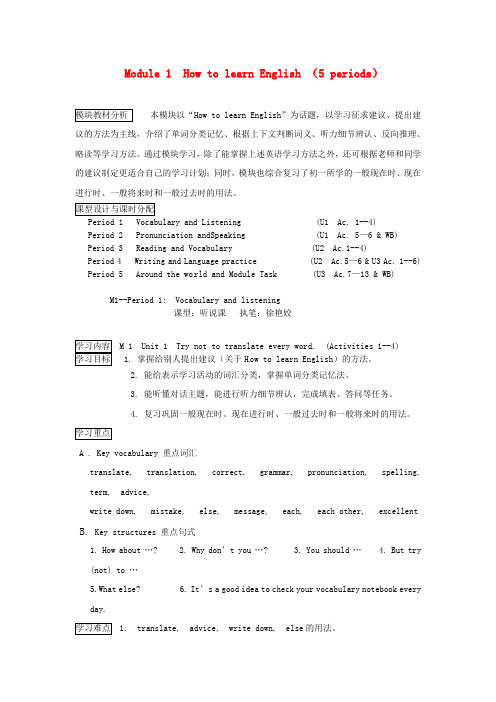
Module 1 How to learn English (5 periods)模块教材分析本模块以“How to learn English”为话题,以学习征求建议、提出建议的方法为主线,介绍了单词分类记忆、根据上下文判断词义、听力细节辨认、反向推理、略读等学习方法。
通过模块学习,除了能掌握上述英语学习方法之外,还可根据老师和同学的建议制定更适合自己的学习计划;同时,模块也综合复习了初一所学的一般现在时、现在进行时、一般将来时和一般过去时的用法。
课型设计与课时分配Period 1 Vocabulary and Listening (U1 Ac. 1--4)Period 2 Pronunciation andSpeaking (U1 Ac. 5—6 & WB)Period 3 Reading and Vocabulary (U2 Ac.1--4)Period 4 Writing and Language practice (U2 Ac.5—6 & U3 Ac. 1--6) Period 5 Around the wo rld and Module Task (U3 Ac.7—13 & WB)M1--Period 1: Vocabulary and listening课型:听说课执笔:徐艳姣学习内容 M 1 Unit 1 Try not to translate every word. (Activities 1--4)学习目标 1. 掌握给别人提出建议(关于H ow to learn English)的方法。
2. 能给表示学习活动的词汇分类,掌握单词分类记忆法。
3. 能听懂对话主题,能进行听力细节辨认,完成填表、答问等任务。
4. 复习巩固一般现在时、现在进行时、一般过去时和一般将来时的用法。
学习重点A . Key vocabulary 重点词汇translate, translation, correct, grammar, pronunciation, spelling, term, advice,write down, mistake, else, message, each, each other, excellentB.Key structures 重点句式1. How about …?2. Why don’t you …?3. You should …4. But try(not) to …5.What else?6. It’s a good idea to check your vocabulary notebook everyday.学习难点 1. translate, advice, write down, else的用法。

Module 1 How to learn EnglishUnit 3 Language in use一、教学内容:Unit 3 Language in use二、课型:Revision and application三、教学目标:1、能正确运用本模块的词汇:club, together, start, hear等。
2、掌握如果提出建议的句型,在同学之间进行真实的交际。
3、能够根据同学的学习情况,就其学习中的问题或困难提出适当的建议;根据别人的建议制定自己的学习计划。
4、提高学习英语兴趣,树立信心,培养其积极主动参与各种语言实践活动的学习态度。
四、教学重难点:运用所学的知识就同学学习中的问题或困难提出适当的建议;根据别人的建议制定自己的学习计划。
五、教学准备:本节课型为Revision and application,根据新课标的要求,结合教材和学生特点,主要采用任务型互动式进行教学,结合情景法、交际法、听说法、归纳法等教学方法实施课堂活动,开启学生思维,通过一系列有条理的教学活动,引导学生自主探究学习和与他人互动合作学习,让学生体验愉快学习。
本节课所需教具及资料:幻灯、图片、调查表等。
六、教学过程:Blackboard design:达标训练题一、单项选择(7分)。
1. Speaking English loudly is good _____ improving my English.A. atB. forC. inD. of.2. ---Don 't forget __________ your homework ,John.---OK . I ' ll do it right now . .A. doingB. to doC. didD. do.3. --- Can I help you, sir ?--- I’d like to have 100 ______ . I want my students to draw pictures.A. piece of paper.B. pieces of papers.C. pieces of paperD. piece of papers4. We should ______our friends when we meet our friends on the street.A. say hello toB. say goodbye toC. saying hello to.D. speak hello to.5. He always practises __________ English so as to improve his oral English .----Of course . You 'd better get much listening practice.A. speakB. speakingC. to speak.D. speaks6. ---- Let’s discuss the play ,shall we ? Would you like ?---- Not now. I ________ to an interview.A. go.B. wentC. was goingD. am going.7. Your sweater looks smart. Where ________you ?A. do, get..B. did,get..C.will, get.D. have,got.二、阅读理解。
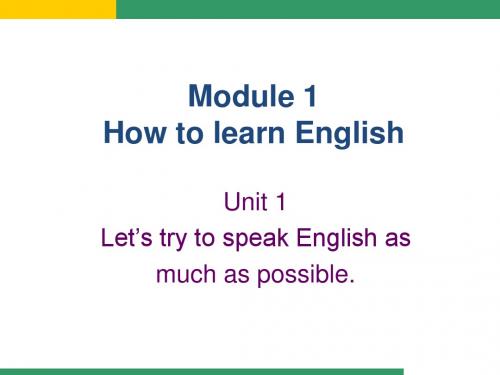
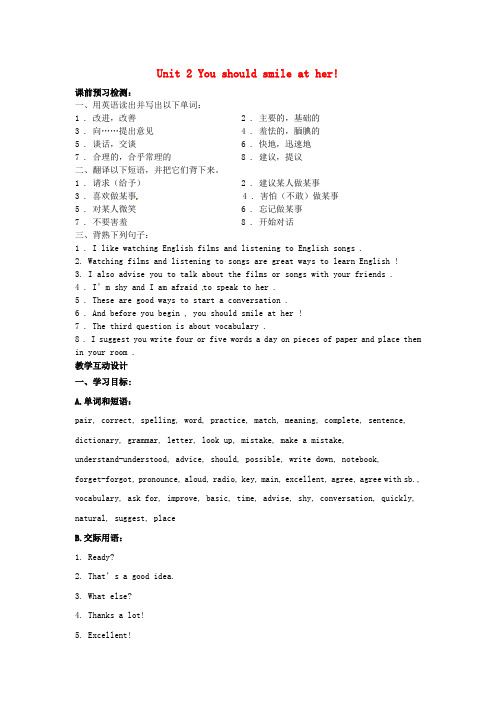
Unit 2 You should smile at her!课前预习检测:一、用英语读出并写出以下单词:1 . 改进,改善2 . 主要的,基础的3 . 向……提出意见4 . 羞怯的,腼腆的5 . 谈话,交谈6 . 快地,迅速地7 . 合理的,合乎常理的 8 . 建议,提议二、翻译以下短语,并把它们背下来。
1 . 请求(给予)2 . 建议某人做某事3 . 喜欢做某事4 . 害怕(不敢)做某事5 . 对某人微笑6 . 忘记做某事7 . 不要害羞 8 . 开始对话三、背熟下列句子:1 . I like watching English films and listening to English songs .2. Watching films and listening to songs are great ways to learn English !3. I also advise you to talk about the films or songs with your friends .4 . I’m shy and I am afraid to speak to her .5 . These are good ways to start a conversation .6 . And before you begin , you should smile at her !7 . The third question is about vocabulary .8 . I suggest you write four or five words a day on pieces of paper and place them in your room .教学互动设计一、学习目标:A.单词和短语:pair, correct, spelling, word, practice, match, meaning, complete, sentence, dictionary, grammar, letter, look up, mistake, make a mistake,understand-understood, advice, should, possible, write down, notebook,forget-forgot, pronounce, aloud, radio, key, main, excellent, agree, agree with sb., vocabulary, ask for, improve, basic, time, advise, shy, conversation, quickly, natural, suggest, placeB.交际用语:1. Ready?2. That’s a good idea.3. What else?4. Thanks a lot!5. Excellent!6. We should always speak English in class.7. Let’s try to speak English as much as possible.8. Why not write down the mistakes in our notebooks?9. It’s a good idea to spell and pronounce new words aloud.10. How about listening to the radio?11 It’s better not to translate.12.It’s a good idea to check new words every day.二. 教学目标1. Function : Giving suggestions (English study)2. Structure: Giving advice: 1) We/You should…2) Let’s try to…3) Why not…?4) It’s a good idea to…5) How about…?6) Why don’t we/you…?7) It’s better not to…3. Skills: 1) Listening and understanding familiar topics (English study).2) Talking about problems in English study and giving advice, conductingconversations in several turns.3) Reading and finding specific information about English study.4) Drafting a letter asking for advice about English study, revisingthrough pair discussion.4. Around the world: English online5. Task: Writing your English study plan.三、重点及难点:Giving advice: 1) We/You should…2) Let’s try to…3) Why not…? 4) It’s a good idea to…5) How about…? 6) Why don’t we/you…? 7) It’s better not to…四、教学设计:Unit 2 You should smile at her!ⅠTeaching modelReading and writing.ⅡTeaching me thodTop-down approachⅢTeaching aims1. Listening and understanding familiar topics (English study).2. Talking about problems in English study and giving advice, conducting conversations in several turns.3. Reading and finding specific information about English study.4. Drafting a letter asking for advice about English study, revising through pair discussion.ⅣTeaching ObjectivesKey vocabulary: ask for, improve, basic, advise, shy, conversation, quickly, natural, suggestⅤTeaching aidsRecorder, OHP, videoⅥTeaching StepsStep 1 Warming-up1. Free talking: How to learn English well?1) We should always speak English in class.2) Let’s try to speak English as much as possible.3) Why not write down the mistakes in our notebooks?4) Don’t forget to write down the correct answers next to the mistakes.5) It’s a good idea to spell and pronounce new words aloud every day.6) How about listening to the radio?7) How about reading English stories?8) W hy don’t we try to find some English pen friends?2. Review the text of Unit 1.Step 2 Work in pairs.Talk about problems you have with…1. understanding English2. speaking English3. learning vocabularyStep 3 Learn new words.1. Show some pictures.2. Talk something about the pictures.3. Introduce the new words.4. Read the words after the teacher.Step 4 Reading.1.Tell the students: There are three basic questions. The first question is about understanding English films and songs. The second question is about speaking. The third question is about vocabulary.2. Play the recording and listen to the tape carefully.3. Ask the students to read through the passage.4. Read the passage and complete the table.4. Check with a partner.5. Call back the answers from the whole class.Keys:1. Watching films and listening to songs are great ways to learn English! Watch and listen several times, and guess the meaning of the new word. Each time you will learn something new. Talk about the films or songs with your friends.2. You can say: “Hello! How are you? Do you like China?”These are good ways to start a conversation. And before you begin, you should smile at her! Don’t be shy.3. Write four or five words a day on pieces of paper and place them in your room. Read the words when you see them, and try to use them.6. Read the text together.7. Learning to learn.List all the things you are good at in learning English. Try to use what you are good at to help you learn what you are not good at.Step 5 Complete the passage.1. Ask the students to the words in the box in Activity 4.2. Ask the students to read through the passage in Activity 4.Diana, the Language Doctor, gives some (1) ___________ advice about learning English. She (2) ___________ you to talk about films and songs, and the (3) _________ of new words. The second piece of advice is this: Start your (4) _________ greetings ora question. She (5) ____________ that you smile before you speak and do not feel(6) ___________. Finally, (7) ____________ your vocabulary with four to five new words every day.3. Complete the passage with the correct form of the words from the box.4. Check with a partner.5. Call back the answers from the whole class.Keys: 1. basic 2. advises 3. meaning 4. conversation 5. suggests 6. shy 7. improve 6. Read the passage together.Step 6 Important and difficult points1 Many students ask for advice about how to improve their English.许多学生询问关于怎样提高英语(水平)的建议。
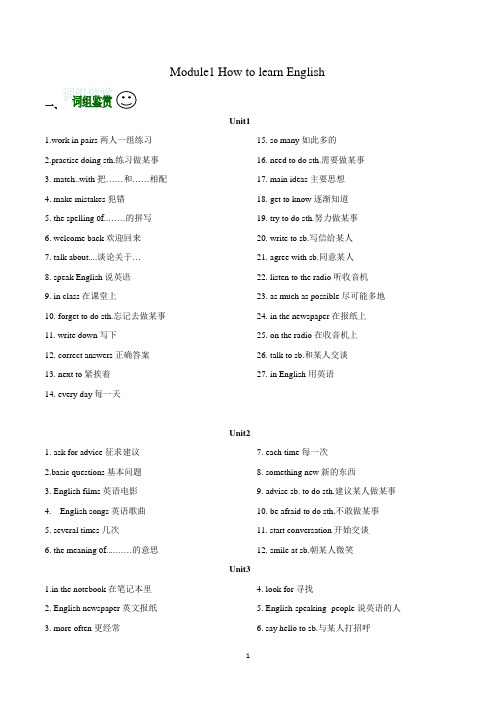
Module1 How to learn EnglishUnit11.work in pairs两人一组练习2.practise doing sth.练习做某事3. match..with把……和……相配4. make mistakes犯错5. the spelling of..……的拼写6. welcome back欢迎回来7. talk about....谈论关于…8. speak English说英语9. in class在课堂上10. forget to do sth.忘记去做某事11. write down写下12. correct answers正确答案13. next to紧挨着14. every day每一天15. so many如此多的16. need to do sth.需要做某事17. main ideas主要思想18. get to know逐渐知道19. try to do sth.努力做某事20. write to sb.写信给某人21. agree with sb.同意某人22. listen to the radio听收音机23. as much as possible尽可能多地24. in the newspaper在报纸上25. on the radio在收音机上26. talk to sb.和某人交谈27. in English用英语Unit21. ask for advice征求建议2.basic questions基本问题3. English films英语电影4. English songs英语歌曲5. several times几次6. the meaning of....……的意思7. each time每一次8. something new新的东西9. advise sb. to do sth.建议某人做某事10. be afraid to do sth.不敢做某事11. start conversation开始交谈12. smile at sb.朝某人微笑Unit31.in the notebook在笔记本里2. English newspaper英文报纸3. more often更经常4. look for寻找5. English-speaking- people说英语的人6. say hello to sb.与某人打招呼7. make friends with sb.和某人交朋友8. take sb. around.带领某人参观…9. an English club一个英语俱乐部10. play games玩游戏11.a few一些12. listen to music听音乐13. all the time-一直;总是14. too many太多二、1.We should always speak English in class.我们应该在课堂内一直说英语。
外研社八年级英语上册Module 1 How to learn English知识点清单课文知识点解析1.practise【词义】v. 练习【用法】后+名词/代词/动词-ing形式【派生词】practice n. 练习【拓展】后接动词-ing形式的其他动词:miss/finish/keep/enjoy/mind/look forward to…【辨析】practise 有规律地练习,特指反复练习;exercise 指训练;锻炼;操练。
2.match【词义】n. 比赛;火柴v. 匹配,搭配【搭配】match…with…把……和……搭配起来3.look up【含义】查,查找【用法】若宾语为代词,放look与up之间;名词放在后面和之间皆可;【拓展】由look构成的其他短语:look at 看look after=take care of 照顾look forward to +sth./ doing sth. 期盼;盼望4.advice【词义】n. 建议【用法】不可数名词some advice 一些建议give advice 提出忠告【辨析】advice 不可数名词suggestions 可数名词【派生词】advise v. 建议5.forget【词义】v. 忘;忘记【常用搭配】forget to do sth 忘记去做某事(事情还未做)forget doing sth 忘记做过某事(事情已做)【拓展】remember v. 记得remember to do sth 记得去做某事(还未做)remember doing sth 记得做过某事(已做)6.suggest【词义】v. 建议;提议【常用搭配】suggest +n. 建议某事suggest doing sth 建议做某事suggest +(that) sb (should) do sth 建议某人应该做某事【派生词】suggestion n. 建议;提议7.write down【含义】写下;记下【用法】后+代词的宾格形式,放在write和down之间;若接名词,放在down前后皆可;8.agree with【含义】赞同;同意【拓展】agree on/about “就……达成一致意见,关于……意见一致”agree to do sth “同意做某事”agree that+从句9.try to do sth 努力做某事try doing sth 尝试做某事try one’s best 尽某人全力try on 试穿try out 试用;试验have a try 试一试10.(1)as …as possible “尽可能……”两as之间用adj./adv.原级【同义结构】as…as one can(2)possible adj. “可能的”【反义词】impossible “不可能的”11. What else? (1)省略疑问句,else根据上文推断其含义;(2)else 放在疑问词和复合不定代词后;(3)辨析else和other:other “其他的”修饰名词,放名词前;12. aloud【词义】adv. 大声地,修饰动词【辨析】aloud adv. 强调发出声音能被听见,常与read,call等词连用;loud adv./adj. 侧重发出的声音大,传得远,修饰speak,laugh等词连用;loudly adv. 有“喧闹,嘈杂”,常与ring,knock等词连用;13. How about…?=What about…?……怎么样?后接名词/代词/动词-ing形式。
Module 1 How to learn EnglishFunctions and Target languageFunctions and Target Language掌握提出建议的表达方式:How about…?Why don’t you…?It’s a good idea to…You should…Try to…Unit 1 Try not to translate every word.1、Try not to translate every word.尽量不要把每个单词都翻译出来。
(1)try to do sth. 尽力做某事, try not to do sth. 尽力不做某事,表建议。
如: I’ll try to be a good student.我尽量争取成为一名好学生。
Try not to make any noise, the baby is sleeping.尽量不要发出任何噪音,孩子正在睡觉。
not to do 是动词不定式的否定形式,即在“to”前加“not”。
如:Tell the children not to play football in the street.告诉孩子们不要在街上踢足球。
如果是省“to”的那种不定式直接在动词前加“not”。
let /make / have sb. not do sth.Let them not go out.让他们别出去。
(2)translate翻译, 常见搭配translate …into…“把……翻译成……” 。
如: Would you like to translate English words into your own language?你愿意把英语翻译成你们自己的语言吗?He translated the speech from Spanish into English.他把这篇西班牙语讲演稿译成了英语。
初二上册Module 1 How to learn English Unit 1 Let’s try to speak English as much as possible. 让我们尽可能多地讲英语同学们,欢送回来!Welcome back, everyone! 今天,我们打算谈论一下学习英语的好方法。
Today, we’re going to talk about good ways to learn English. 准备好了吗?Ready? 谁有一些建议?Who has some advice? 在课堂上我们应该总是讲英语。
We should always speak English in class. 好!让我们尽可能多地讲英语。
Good! Let's try to speak English as much as possible. 为什么不在我们的笔记本上记下错误呢?Why not write down the mistakes in our notebooks? 那是个好主意,而且不要忘记在错误旁边写上正确的答案。
还有其他的什么吗?That’s a good idea. And don’t forget towrite down the correct answers next to the mistakes. What else? 每天大声拼读生词是一个好主意。
It’s a good idea to spell and pronounce new words aloud every day. 非常感你,玲玲。
听播送怎么样? Thanks a lot, Lingling. How about listeningto the radio? 是的,那也有益于我们的发音。
但有很多生词。
Yes, that’s good forour pronunciation too. But there are so many new words. 你们不必理解每个单词〔的含义〕。
Unit 1 Let's try to speak English as much as possible●1 pair n. (相关的)两个人,一对[观察] Work in pairs. 结对练习。
Boys and girls! Please check your homework in pairs. 同学们!请结对检查你们的作业。
[探究] (1)pair是可数名词,常用短语为“in pairs”,意为“成对地,成双地”,表示在两人之间进行的某件事情或某项活动。
Please ask and answer in pairs.请两人一组进行问答。
(2)pair还可用于短语“a pair of”,意为“一对,一双,一副……”,后接裤子、眼镜、手套、鞋子等成双成对的事物。
a pair of shoes一双鞋two pairs of trousers两条裤子[注意] (1)英语中习惯把“一双新运动鞋”表达为“a new pair of trainers”而非“a pair of new trainers”。
(2)“数词+pair(s) of…”在句中作主语时,谓语动词的单复数取决于pair的单复数形式。
Three pairs of jeans are in the bag.包里有三条牛仔裤。
C.on a pair D.on pairs[解析] A in pairs意为“成对地,成双地”。
句意:我们通常结对练习对话。
故选A。
●2 practise v. 练习[观察] Practise saying the words.练习说单词。
Lucy practises the piano every day.露西每天练习(弹)钢琴。
[探究] practise 为及物动词,practise sth./doing sth.意为“练习(做)某事”。
We often practise speaking English.我们经常练习说英语。
How to learn English
模块语法聚焦一
建议表达法
在英语中,我们可以用多种表达方式提建议或征求对方的意见,大多数语气比较委婉,显得客气而有礼貌。
1.“Shall we/I…?”意为“我们/我……好吗?要不要……?”常用来建议对方与自己一起做某事,后面的谓语动词用原形,常用于第一人称。
此句型的肯定回答可用“OK./Good idea.”等;否定回答可用“No, let's…/Sorry, I'm afraid I can't.”等。
—Shall we meet inside the zoo?
我们在动物园里面见面好吗?
—No, let's meet outside the zoo.
不,我们在动物园外面见面吧。
2.“__Let's…__”意为“咱们……吧” 后面接不带to的不定式(即动词原形)。
Let's go and ask the teacher. 咱们去问老师吧。
3.“__What/How_about…__?”意为“……怎么样?”(讲解见Module 1 Unit 1句型透视③)
4.“__Why_not…__?”意为“为什么不……?”not后面接动词原形。
“Why not…?”实际上是“Why don't you/we…?”的简略形式。
Why not go with me?
为什么不和我一起去呢?
5.“__Would_you_like…__?”意为“你想要……吗?” like后可接名词、代词或不定式。
Would you like another cup of tea?
你想再来一杯茶吗?
( )1.—Would you like to go to the zoo with us?
—________
A.No. I'm busy.
B.Why not?
C.Thank you.
D.That's all right.
( )2.—Shall we play football this afternoon?
—________
A.Yes, that's right.
B.OK. I'll be free then.
C.What's the matter?
D.Of course, you may.
( )3.阜康中考—Look! It's raining heavily! ________ take a raincoat with you?
—Well, I'll take one right now.
A. Why not
B. Why don't
C. Would you mind
D. Would you like
( )4. —It's a fine day. Shall we go climbing?
—________. Let's go.
A.It's boring
B.Of course, you will
C.That sounds good
D.No, thank you
( )5.—It's hot. Let's go swimming!
—________.
A.Don't say that B.That's nothing
C.It's a good idea D.You're welcome
( )6.杭州中考—What about having a drink?
—________.
A. Help yourself
B. Never mind
C. You're right
D. Good idea
( )7.—What a nice day! Let's go for a picnic on the beach together. —________!
A. Goodbye
B. Good idea
C. Good job
D. Good day
( )8.—Shall we surf the Internet, Lucy?
—________.
A. Me, too
B. The same to you
C. Great
D. OK. Thank you
[答案] 1—5 BBACC 6—8 DBC
2。